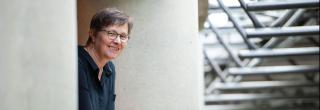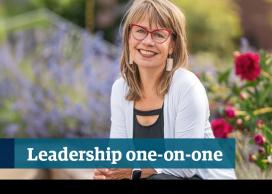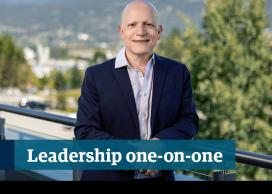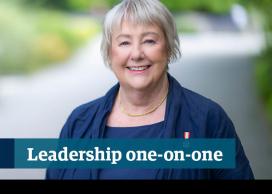Susan is a molecular biologist by trade. Originally from Montreal, she came to UBC in 1980 to complete her PhD and was appointed as Assistant Professor in 1991.
She left basic research six years later to lead the molecular diagnostic work for the microbiology laboratory at Vancouver General Hospital. With an interest in graduate education, she became increasingly involved in administration, culminating in her appointment in 2011 as interim Dean of Graduate Studies, and as Dean and Vice-Provost in 2013. In her role, she leads the charge in championing graduate education and postdoctoral studies at UBC, and helping to ensure they are the best they can be.
Q1. What quality do you most admire in a leader?
SP: I admire lots of qualities, but essential to any leader is integrity.
I also greatly value someone who is principled, but whose principles are balanced with wisdom. I admire a leader who is visionary, but open minded, a good listener and collaborative. And finally, I admire a leader who is strong, but has a generous spirit.
Q2. What makes you laugh?
SP: Sharp wit out of left field. That, and The Ministry of Silly Walks.
Q3. Who inspires you, and why?
SP: I am greatly inspired by my family—their strength and grace in very difficult circumstances.
Q4. What’s your biggest accomplishment so far at UBC?
SP: Something I’m very proud of (although was a team effort rather than a personal accomplishment) is the growth of professional development opportunities for graduate students and postdoctoral fellows at UBC. Linked to this is the growing conversation around broadening conceptions of a PhD, which I’m really excited to be contributing to.
Q5. What is the most important lesson you’ve learned?
SP: I’m continually learning, and I’m not sure I could name a single most important lesson yet. In working with people toward common goals, I’ve certainly seen the importance of doing solid groundwork, of listening, and of being creative in working through possible pathways to those goals. I’ve also learned that it’s OK to be yourself, and that perseverance is critical, as is not being weighed down by mistakes or the small stuff.
Q6. How do you like to recharge?
SP: By taking walks in the woods, playing the piano, and settling into a hot bath with a good book.
Q7. What is the best advice you were ever given?
SP: (1) If you don’t fall, you’re not trying hard enough (my cousin’s advice - in the context of skiing, but really about life). (2) There’s no limit to what you can accomplish if you don’t care who gets the credit. (3) You should bend over backwards to show how you may be wrong (Richard Feynman’s advice about scholarship, but true as well for much of public life).
Q8. What do you value in your colleagues?
SP: I really value ambition to make a positive difference, and the ability to put common goals above self-interest. I value integrity, grace, and kindness, as well as insight, hard work, and the ability to not take oneself too seriously.
Q9. What would you like to be remembered for?
SP: For making a positive difference to the institution and in peoples’ lives.
Q10. If you could have a super power, what would it be?
SP: Super human intelligence, so I’d know the right thing to do all the time.
Q11. What do you think the future holds for higher education?
SP: I’m not a futurist, but I can guess that higher education will deepen its interconnection with the public sphere. We’ve certainly been going that direction and there are lots of possibilities for further integration, which I find very exciting. I also see different forms of learning, including more experiential and hybrid learning. I see a need for more accountability and hence, more metrics. And finally, I see a need for increased creativity with revenue generation.
Q12. What do you think are the biggest misconceptions about graduate school?
SP: I think some misconceptions still exist around the likelihood of PhD graduates getting faculty jobs. That’s no longer a norm. I believe some students think it takes less time than it actually does to complete their studies. There are also some misconceptions that the research process consists of just doing the research, getting results and publishing them. Of course in reality, things don’t always work. You go down dead ends, you find problems, and you have to change course. Not everyone realizes that going into it.
Q13. For you, what makes UBC different?
SP: The amazing setting, of course.
I also value that UBC is adventurous. We’re always striving to be the best (and in many ways, we are!). I’m deeply moved by the fact that we value service for the public good, and that we nurture equitable, compassionate and genuine relationships with one another.
Published: May 1, 2015
Interviewed by: Megan Czerpak, UBC Internal Communications



